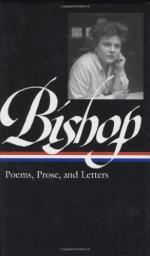|
This section contains 855 words (approx. 3 pages at 300 words per page) |

|
The poetry of Elizabeth Bishop sustains seemingly contradictory commentary: she is an autobiographical poet with an impersonal touch; a surrealist given to meticulous observations of natural facts; a formalist whose poems are open-ended accumulations of detail. Bishop's work resists analysis in terms of such romantic and modernist oppositions as art and life, subject and object, dream and reality, experiment and convention. While she revises the dualistic thinking of her predecessors, her strategy reverses that of other postmodernists: in her work, it is not art that is reduced to experience, but experience that tends to be reduced to art. The "objective" world of experience in Bishop is never a natural source but always an already represented world, and this given, original distance informs her poetry. For Bishop's uniqueness does not lie in her peculiar sensibility, as the largely descriptive criticism of her work—encouraged by her own irreverence toward...
|
This section contains 855 words (approx. 3 pages at 300 words per page) |

|


